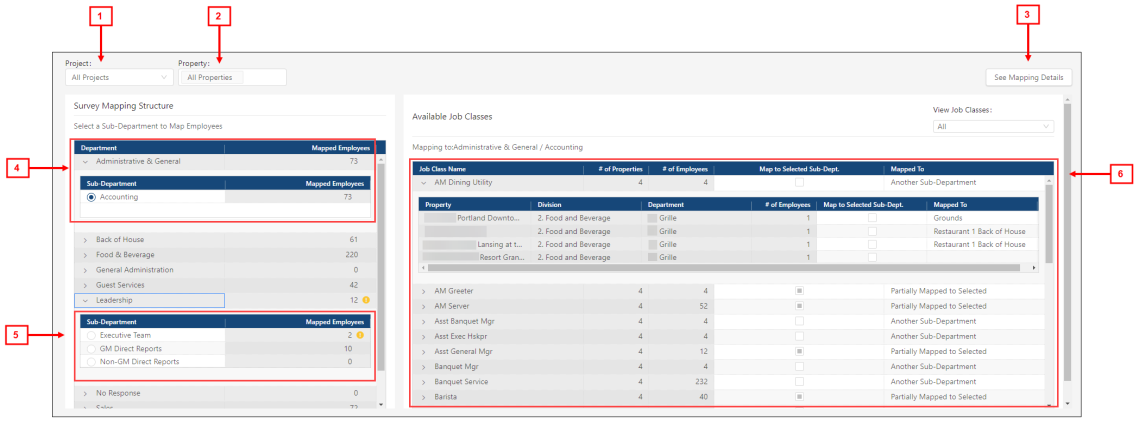Department Mapping tab of STAFFScope Campaign Management
Use the Department Mapping tab of STAFFScope Campaign Management to group multiple sub-departments into a single job class. For departments that have low numbers of employees, mapping them to other job classes ensures that their anonymity is protected in surveys. Icons ( ) indicate which departments have low numbers of employees that need to be grouped with other departments.
Note: The configured minimum threshold for anonymity is 5.
Note: Department mapping is applicable only to RMS clients. The labor structure is imported from the RMS database associated with the property. On the Properties tab of STAFFScope Campaign Management, Org Sync must be turned on ( ) for the RMS labor structure to be imported.
) for the RMS labor structure to be imported.
Notes on terminology:
The following terms are used interchangeably throughout the STAFFScope Campaign Management screens:
survey period = survey campaign
location = property
sub-department = job = job class

Fields on the Department Mapping tab of STAFFScope Campaign Management
| # | Field | Description | Notes |
|---|---|---|---|
|
1 |
Project |
Select the project for which to view mappings. A survey project refers to the UnifocusSurvey Solutions product or modules with which the survey period is associated. Projects might include STAFFScope, MEETINGScope, GUESTScope, SERVICEScope, and so on. For example, a STAFFScope project is a unique project associated with the UnifocusSTAFFScope product. |
|
|
2 |
Property |
Select one or multiple properties to which the mapping is applied. |
Default: All Properties. |
|
3 |
See Mapping Details |
Opens the Mapping Details dialog box in STAFFScope Campaign Management, which displays a tree menu of the mapping structure and lists the number of employees mapped to each department and sub-department. |
|
|
|
Survey Mapping Structure | ||
|
4 |
Departments and Sub-Departments |
The table includes all departments and sub-departments that are imported from the RMS database.
|
Departments and sub-departments are defined in the RMS database that is associated with the property. Departments and sub-departments are sorted alphanumerically. The first sub-department is expanded by default. |
|
5 |
Mapped Employees |
Number of employees that are mapped to the department or sub-department. If there are mapping issues with the department or sub-department, an icon ( If there are too few employees, you will not see survey data for the employees or sub-department in generated reports. |
|
|
6 |
Available Job Classes |
This section lists all the available jobs (organized by sub-department) that are available to be mapped with the department or sub-department selected in the Survey Mapping Structure section. Jobs that do not meet the threshold appear at the top of the section. |
|
|
|
View Job Classes |
Use this filter for selecting which jobs within the selected departments and sub-departments to view. Jobs that do not meet the threshold criteria appear at the top of the list. |
|
|
Mapping to: |
Name of the RMS department to which the selected department is mapped. |
Read-only. |
|
|
Job Class Name |
Name of the jobs in the selected department and sub-department. |
|
|
|
# of Properties |
Number of properties associated with the selected job class or property. |
|
|
|
# of Employees |
Number of employees in the selected job class or property. |
|
|
|
Map to Selected Sub-Dept. |
Select the check box to map the job to the selected sub-department. |
|
|
|
Mapped To |
Sub-department to which the selected job is mapped. |
Read-only. |
|
